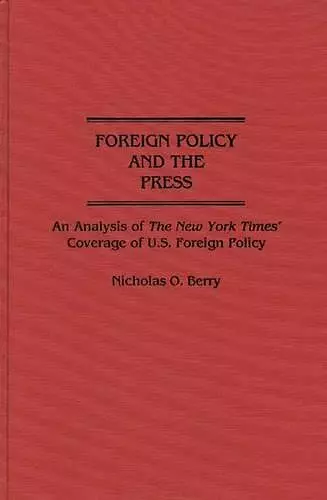Foreign Policy and the Press
An Analysis of The New York Times' Coverage of U.S. Foreign Policy
Format:Hardback
Publisher:Bloomsbury Publishing PLC
Published:17th Oct '90
Currently unavailable, and unfortunately no date known when it will be back

Based on a content analysis of New York Times' reporting of five recent foreign policy disasters, Berry explores the thesis that the press accepts administration assumptions on foreign policy matters, but only until the policy fails. The work also addresses the differences between domestic and foreign policy reporting, and compares the work of foreign-based correspondents with that of U.S.-based reporters.
In a final chapter he discusses the implications of his findings and addresses such issues as the difference between domestic and foreign policy reporting and the notion that foreign-based correspondents are more critical of foreign policy than are U.S.-based reporters.The role that the press plays in foreign policy is generally seen as taking one of two forms. It is either cited as an active participant in the policy process or as an instrument to be molded and manipulated by the president and his media managers. This study challenges both of these views and demonstrates that the press is neither a powerful force in foreign policy nor under the control of the government in its reporting of foreign policy. Nicholas Berry concludes that to a far greater extent than with domestic policies, the press is at one with the foreign policy establishment, accepting the government's assumptions and formulations until a policy begins to fail. At this outcome stage, the government tries, unsuccessfully, to manipulate the critical press. The study is based on a content analysis of The New York Times' reporting of foreign policy disasters. Five case studies were chosen for five recent presidents: the Bay of Pigs (Kennedy), Vietnam (Johnson), the Cambodian incursion (Nixon), the Iran hostage crisis (Carter), and the 1982-1984 intervention in Lebanon (Reagan). In each case, The New York Times' articles were examined and analyzed against the administration's foreign policy statements. Berry details the policy orientation of each administration, describes the Times' coverage, and draws conclusions in all five cases. In a final chapter he discusses the implications of his findings and addresses such issues as the difference between domestic and foreign policy reporting and the notion that foreign-based correspondents are more critical of foreign policy than are U.S.-based reporters. Two appendices and a bibliography are also included. This important study will be a valuable resource for courses in journalism, behavioral studies on the media, and American foreign policy, and a significant addition to public, college, and university libraries.
ISBN: 9780313274190
Dimensions: unknown
Weight: 907g
184 pages